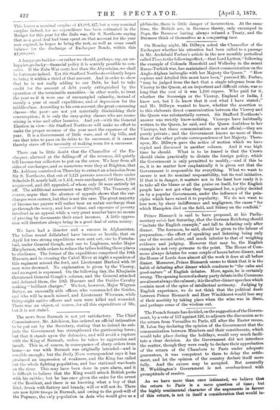On Monday night, Mr. Dillwyn asked the Chancellor of the
Exchequer whether his attention had been called to a passage in Mr. Archibald Forbes's article in the new monthly periodical called Time, to the following effect, —that Lord Lytton, " following the example of Colonels Mansfield and Wellesley in the Recent Russo-Turkish war, has maintained direct communication on the Anglo-Afghan imbroglio with her Majesty the Queen." "How copious and detailed this must have been," pursued Mr. Forbes,. "may be judged from the fact that a single telegram from the Viceroy to the Queen, at an important and difficult crisis, was so long that the cost of it was 1,100 rupees. Who paid for it,. whether the Sovereign or the Viceroy, England or India, I know not, but I do know that it cost what I have stated;" and Mr. Dillwyn wanted to know, whether the assertion as to this elaborate direct communication between the Viceroy and the Queen was substantially correct. Sir Stafford Northcote's answer was strictly know-nothing. Viceroys have habitually written to the Queen, he said, and the Queen doubtless to her Viceroys, but these communications are not official,—they are purely private ; and the Government knows no more of them than of the other private correspondence of her Majesty. There- upon, Mr. Dillwyn gave the notice of motion which we have copied and discussed in another column. And it was high time he should. What is to be feared is that the Crown should claim practically to dictate the foreign policy, which the Government is only permitted to modify,—and if this be" so, it is no matter how emphatically it is given out that the Government is responsible for everything. What we want to secure is not its nominal responsibility, but its real initiative. If that is in danger, it matters not in the least how ready it is to take all the blame or all the praise on itself, for the English people have not got what they bargained for, a policy decided on by a popular Government, under the influence of the prin- ciples which have raised it to popularity. We do not want to lose now, by sheer indifference and negligence, the cause " for which Hampden died on the field, and Sidney on the scaffold."


































 Previous page
Previous page